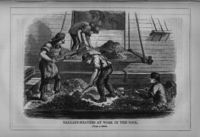Annotation:Ballest Heavers (The)
Back to Ballest Heavers (The)
BALLAST HEAVERS, THE. English, Country Dance Tune (whole time). B Flat Major. Standard tuning (fiddle). AABB. Ballast Heavers were working men who made a marginal existence working on the docks performing manual labor. Henry Mayhew, writing in his London Labour and the London Poor, volume 3 (1851) explains:

The duty of the ballast-heaver is to heave into the holds of the ship the ballast brought alongside the vessel by the Trinity-lighters from the dredging-engines. The ships take in ballast either in the docks or in the Pool. When the ship is cranky-built, and cannot stand steady after a portion of her cargo has been discharged, she usually takes in what is called shifting or stiffening ballast. The ballast is said to stiffen a cranky vessel, because it has the effect of making her firm or steady in the water...The application for ballast is seldom made directly from the captain or shipowner himself. There are parties living in the neighbourhood of Wapping and Ratcliffe who undertake, for a certain sum per score of tons, to have the requisite quantity of ballast put aboard the ship. These parties are generally either publicans, grocers, butchers, lodging-house-keepers or watermen, and they have a number of labourers dealing with them whom they employ to heave the ballast on board. The publicans, butchers, grocers, or lodging-house-keepers, are the ballast-contractors, and they only employ those parties who are customers at their houses. It is the owner or captain of the vessel who contracts with these "truckmen" for the ballasting of the ship at a certain price per score of tons, and the truckmen for that sum undertake not only to procure the ballast from the Trinity Company, and save the owner or captain all the trouble of so doing, but also to carry it from the Trinity-lighters on board the ship. The reason of the publicans, grocers, butchers, or lodging-house-keepers, undertaking the job is to increase the custom at their shops, for they make it a rule to employ no heavers but those who purchase their goods from them.
As a class they were exploited and often ended up with little to show for their work, save for the food and drink supplied to them by the contractors during the work-day.
Source for notated version:
Printed sources: Straight (24 Favourite Dances for the Year 1779), 1779; p. 11.
Recorded sources:
Back to Ballest Heavers (The)
